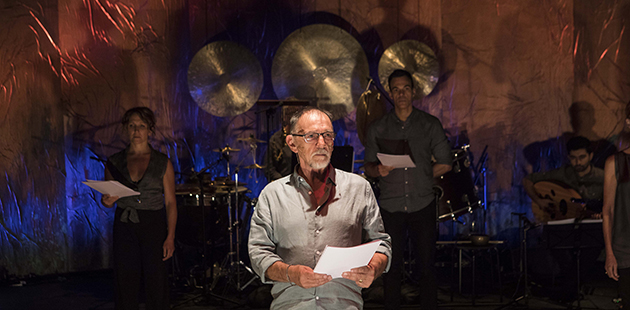 Over the course of nine hours the majority of the Iliad was performed, including many of the well known strands of the narrative. The story begins in medias res towards the end of the Greek decade-long siege of Troy, or Ilium.
Over the course of nine hours the majority of the Iliad was performed, including many of the well known strands of the narrative. The story begins in medias res towards the end of the Greek decade-long siege of Troy, or Ilium.
William Zappa (Actor, Adaptor, Director) began by noting that Troy is not far distant from ANZAC Cove, answering those critical questions of the theatre ‘Why this play’ and ‘Why now?’ Zappa gave a fascinating analysis of Homer’s care for those that perish in his stories: in modern films, during car chases, we see the cars exploding, and bystanders suffering anonymously.
Whereas Homer often takes pains to provide biographical details of his unfortunates; e.g. descriptions of a wife and child they will never see again. In this way the Iliad is not a glorification of war, but a warning. I sat next to a classicist and we decided the Iliad is the ultimate display of toxic masculinity: she also informed me that toxic is a Greek word, from toxikon, or ‘poison for arrows’, which seemed appropriate.
We hear of Achilles’ fury at King Agamemnon for taking away his female prisoner of war, Briseis. The Gods argue amongst themselves, much like the humans, and freely interfere in mortal affairs when it suits them, planting dreams in the minds of men, or whisking them away to safety.
Zeus, however, exhorts the Olympians not to interfere too much. Many Greek and Trojan heroes face off in single combat. The war rages back and forth, with furious Achilles watching on from his ships until his beloved Patroclus is killed. Achilles gets a new shield from Hephaestus, God of blacksmiths, and avenges his soul mate. Zeus lifts his directive and the Gods rush in to meddle in the final climatic moments of the siege.
King Priam of Troy, father of slaughtered Hector, begs Achilles to return his son’s body. Although the story concludes with the mourning of Hector, and before the fall of Troy, Homer has told so much of the tale through prophesies that the listener has a sense of the whole.
Each of the four actors brings their own flair to the reading, giving a wonderful sense of dynamism. It’s fascinating not only how much a particular translation can impact on meaning, but also the speaker’s interpretation. With the raise of an eyebrow or the shrug of a shoulder, Heather Mitchell puts an at times wry inflection on lines that otherwise might be considered out of step with modern sensibilities.
It’s always such a pleasure to see actor and adaptor William Zappa on stage, and here he puts his sonorous voice to work, introducing the piece and guiding his listeners wonderfully through the ancient landscape. Socratis Otto brings a youthful zeal: his power of evocation is immense. Blazey Best captivates and builds great sympathy for the plight of her characters.
The actors are accompanied by a live score of percussion (Michael Askill) and oud (Hamed Sadeghi). This is so judiciously incorporated that I often wasn’t aware of the music, only its effects; heightening tension, or softening a tender interaction.
A great sheet of bronze formed the backdrop to the action: this did make me reflect on the way the story is fuelled by that metal. It’s all caught up with the effectiveness of these deadly tools of war. The symbols for the percussion section were suspended like circular Greek shields. The actors paced on a wide circle of sand, transporting us to the beaches outside Troy.
Zappa adapted his text from many different translations, from Alexander Pope (1720) to Caroline Alexander (2015). If you get the chance to see this show I highly recommend it. The actors were recalled to the stage again and again by rapturous applause: the sense of having participated in a holy and ancient ritual was palpable.
The Iliad – Out Loud
Belvoir St Theatre, Belvoir Street, Surry Hills
Performance: Sunday 27 January 2019
Information: www.sydneyfestival.org.au
Image: The Iliad – photo by Lisa Tomasetti
Review: Oliver Wakelin
